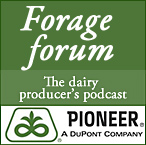 The American Butter Institute (ABI) and the American Dairy Products Institute (ADPI) will meet next month from April 26-28, 2009 at the Hyatt Regency in Chicago, Ill. for their Joint Annual Meeting.
The American Butter Institute (ABI) and the American Dairy Products Institute (ADPI) will meet next month from April 26-28, 2009 at the Hyatt Regency in Chicago, Ill. for their Joint Annual Meeting.
This year’s conference will address current critical issues affecting the dairy industry, such as the fluctuations in markets and what lies beyond the current dip in prices. Keynote speaker Peter Luongo, former President and CEO of the Berry Company and current executive director of the Center for Leadership & Executive Development at the University of Dayton, will offer timely insights on effective executive leadership in challenging economic times. During his 33 year career with the Berry Company, Luongo not only “talked the talk,” but also “walked the walk” as he helped the company’s revenues grow from $75 million to $450 million during his final six years as head of the company.
“The 2009 Annual Conference features a terrific program this year with an impressive line-up of industry speakers. The Conference offers a unique opportunity for both proprietary and coop dairy processors, as well as numerous customers, suppliers and traders, to come together in Chicago to conduct business, network and to advance the overall interests of the manufactured dairy products industry,” stated Dale Kleber,
Chief Executive Officer, ADPI.
Over the course of two days, the ABI/ADPI conference will examine a variety of topic areas that include the dairy industry and consumption trends of the world’s largest dairy market in China (including a further look into the recent melamine scandals), policy updates from Washington, new dairy commodity futures and options products, and international whey products. The Tuesday lunch will feature Jeff Thredgold, President of Thredgold Economic Associates, who will help decipher the tangled maze of today’s economy.

 Dairy Markets Week in Review
Dairy Markets Week in Review
 Congratulations to Bruce A. McPheron, for being appointed dean of the University’s College of Agricultural Sciences, effective July 1, pending approval of the Board of Trustees on March 20. McPheron will succeed Robert D. Steele, who is stepping down after 12 years to return full-time to the college’s faculty as a professor in the Department of Food Science. McPheron currently serves as the associate dean for research and graduate education in Penn State’s College of Agricultural Sciences and director of the Pennsylvania Agricultural Experiment Station.
Congratulations to Bruce A. McPheron, for being appointed dean of the University’s College of Agricultural Sciences, effective July 1, pending approval of the Board of Trustees on March 20. McPheron will succeed Robert D. Steele, who is stepping down after 12 years to return full-time to the college’s faculty as a professor in the Department of Food Science. McPheron currently serves as the associate dean for research and graduate education in Penn State’s College of Agricultural Sciences and director of the Pennsylvania Agricultural Experiment Station.
 A semester into my first year of college, I decided that I needed a part-time job, so I applied for a lab assistant job at Dairy Microbiology. I was pretty excited about the job as it paid well, and I was fascinated by the dairy industry. Plus, I got to take home free milk, cheese and ice cream samples home as a benefit. Free ice cream? Hello, dream job!
A semester into my first year of college, I decided that I needed a part-time job, so I applied for a lab assistant job at Dairy Microbiology. I was pretty excited about the job as it paid well, and I was fascinated by the dairy industry. Plus, I got to take home free milk, cheese and ice cream samples home as a benefit. Free ice cream? Hello, dream job! The Department of Agriculture, Trade and Consumer Protection (DATCP)
The Department of Agriculture, Trade and Consumer Protection (DATCP)  New U.S. Agriculture Secretary Tom Vilsack recently conducted a
New U.S. Agriculture Secretary Tom Vilsack recently conducted a  Now is the time to start assessing the yield potential for
Now is the time to start assessing the yield potential for 